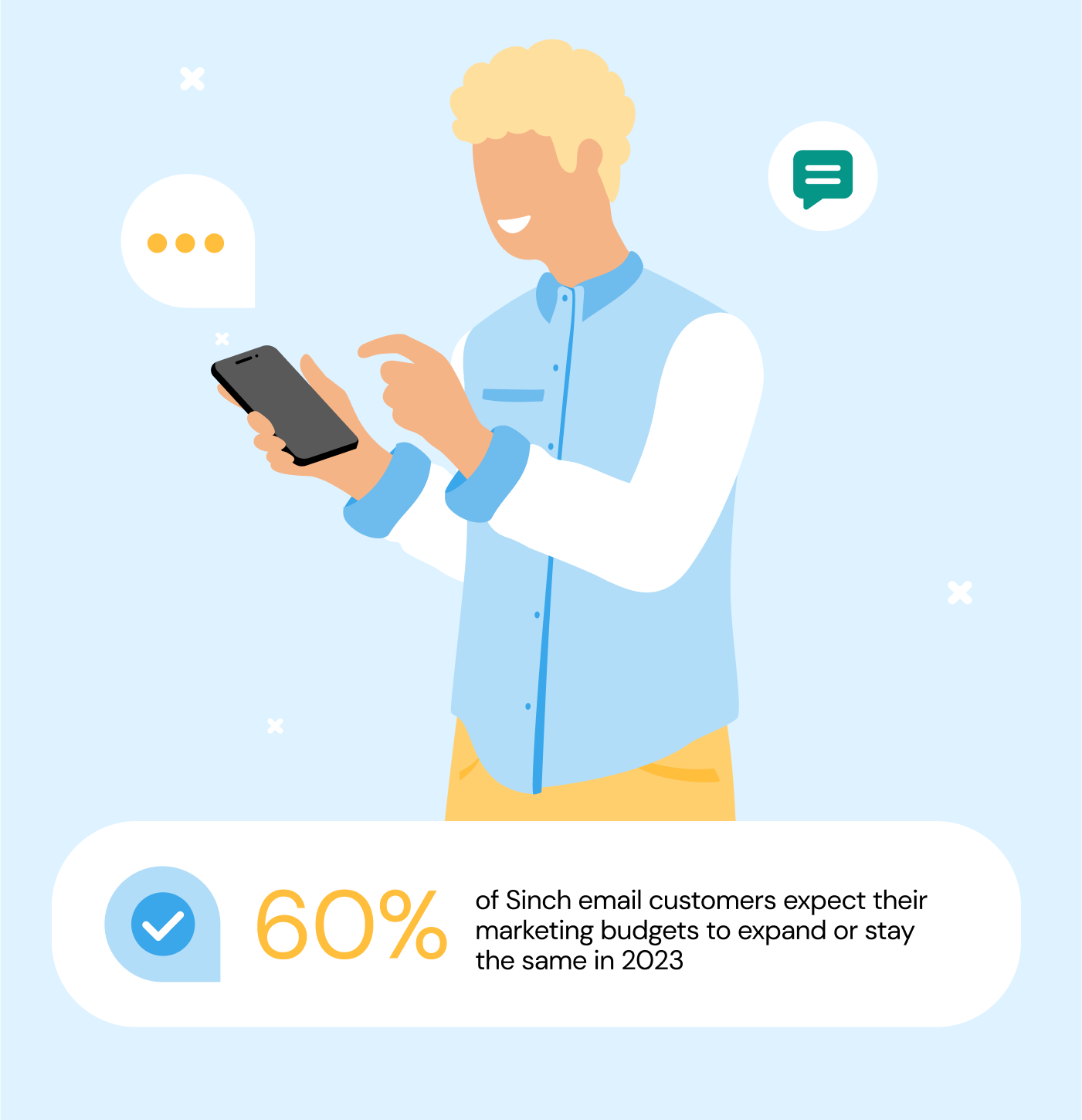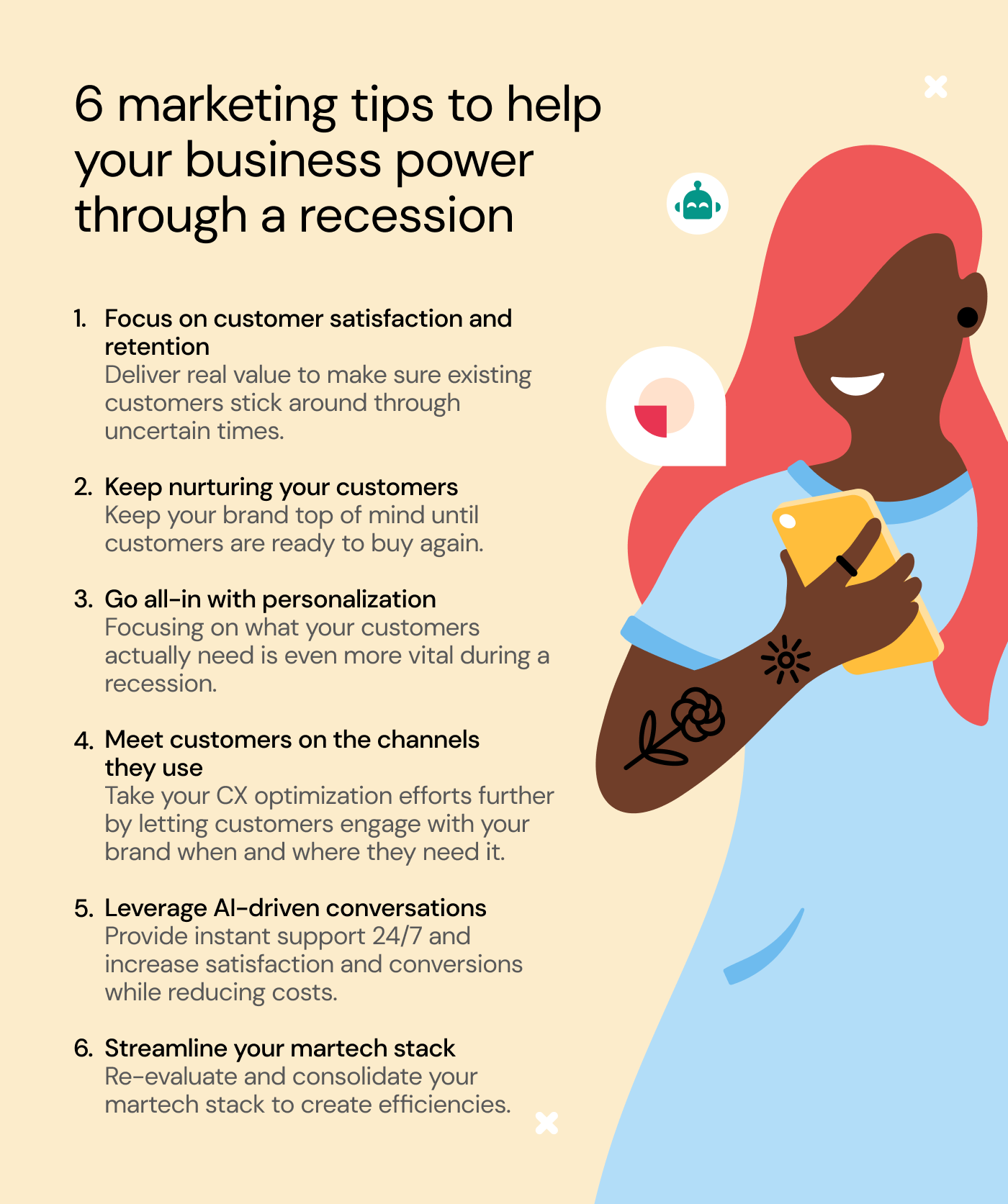How to market in a recession: 6 strategies to help your business thrive


When times get tough, marketing spend might be one of the first cost-cutting targets in many organizations, leaving marketers faced with the challenge of maintaining revenue and growth with shrunken budgets.
While short-term savings are essential, businesses that invest in innovation and marketing during an economic downturn will likely be the ones reaping the rewards when the economy starts to pick up again.
With the right marketing tactics and technology, your business will not only thrive through the recession but also get a major edge over the competition for many years ahead.
In this blog post, we explore why businesses should double-down on marketing — and more specifically, customer retention — in times of economic uncertainty, and how they can revisit their strategy to make the most of their dollars and efforts.

With a potential recession on the horizon, cutting your marketing budget seems like a logical move and is sometimes inevitable, but in times of uncertainty, communicating with your core customers is more vital than ever to keep your brand top of mind and avoid losing them to more aggressive competitors.
Revisiting your marketing strategy to focus on keeping customers happy and engaged can help your company unlock new growth opportunities and maximize ROI despite potential belt-tightening measures.
We recently surveyed 1,300 Sinch email customers, asking them how they feel about marketing during an economic downturn. Here’s a sneak peek at some of the findings:
The lesson? When budgets get tight, invest your efforts and marketing dollars on channels with proven ROI — and although there isn’t necessarily a one-size-fits-all answer, it’s usually channels that allow you to segment and tailor your marketing messages to your customers.
Let’s explore strategies to help you make the most of your marketing efforts and stay close to your customers during a downturn.

This is crucial all year round, but probably even more during a recession. Research from Hubspot found that 93% of customers are likely to make repeat purchases with companies that offer excellent customer service and 75% are ready to spend more to buy from companies that give them a good experience.
As you probably know, retaining customers is much cheaper than acquiring new ones, so focus on delivering real value to make sure existing customers stick around through uncertain times.
Today’s customers want to do business with brands that understand their struggles. In times of economic crisis, this means, for instance, coming up with helpful solutions to support customers facing financial issues. Just like Nationwide did!
The bank granted a payment holiday to customers in the early stage of COVID to support those economically affected by the pandemic. When that period ended, they used rich SMS to provide personalized information about next steps. Why did it work? Because they offered a truly valuable solution to support distressed customers through tough times and delivered it in a compelling, convenient format — and this can earn you customers for life.
Customers may be tightening their wallets, but this is not the time to drop all your nurturing efforts. Using email or conversational messaging channels, brands can create compelling nurture campaigns to ensure they remain the go-to choice when customers decide to spend their precious dollars — or to keep their brand top of mind until customers are ready to buy again. And here again, think value-adding content.
In retail and e-commerce, brands can craft email and mobile messaging campaigns that resonate with cost-conscious customers by including cost-saving suggestions, offering “buy now, pay later” billing options — and toning down splashy promotional language…
Personalization is everything, and that’s even truer during a recession. With so many households cutting non-essential purchases and struggling to make ends meet, chances are many customers won’t respond well to random marketing messages promoting products they don’t actually need.
Personalizing the offers in your emails and mobile messages not only improves opens, clicks, and conversion rates, it’s also an excellent way to improve loyalty — because today’s customers want brands to know them and their needs.
An omnichannel approach takes your CX optimization efforts even further, by letting customers engage with your brand when and where they need it and move from one channel to another while always retaining continuity. Cloud-based omnichannel contact center solutions provide everything your teams need to deliver five-star omnichannel service while eliminating infrastructure and maintenance costs.
Integrating AI natural language understanding within your customers’ favorite messaging channels is another great way to deliver more meaningful experiences. Research shows that 89% of consumers say they want two-way conversations via messaging channels and apps.
Conversational AI helps businesses take it to the next level and provide instant answers to customer queries 24/7, which not only helps increase satisfaction but also removes the barriers to conversions. Bonus: It also allows your support agents to dedicate more time to complex queries that require human assistance.
But keep in mind that giving customers an easy way to switch from a messaging chatbot to human assistance is key in creating satisfying AI-driven experiences. Research shows that in moments of frustration, 40% of consumers want to talk to a human agent.
Re-evaluating and consolidating your martech stack to create efficiencies is a smart cost-saving move during a recession — or at any time, really.
Your legacy communications system might be costly and complex to evolve or lack the features needed to drive marketing innovation.
Cloud communications solutions like CPaaS (Communications Platform as a Service) let businesses integrate real-time communications features like messaging, voice, email, video, conversational AI, and more into their workflows without any heavy IT lifting.
With the right provider, you’ll be able to bring all these channels under one roof. Not only does it eliminate the need for your marketing teams to juggle multiple solutions, but it also usually means more scalability and cost-effectiveness.
When economic waters get rough, consider marketing and technology as growth investments that will pay dividends for years to come. With the strategies above, marketing managers will be well positioned to strengthen customer relationships and deliver a differentiating experience that drives results, no matter what the economy throws at them.